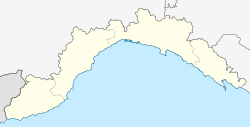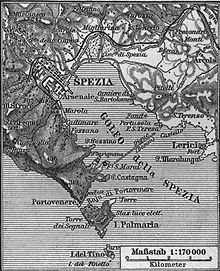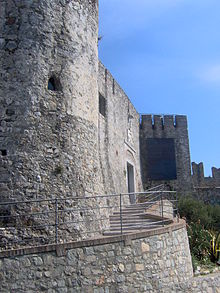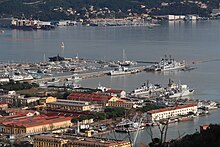| This article includes inline citations, but they are not properly formatted. Please improve this article by correcting them. (March 2024) (Learn how and when to remove this message) |
Comune in Liguria, Italy
| La Spezia A Spèza (Ligurian) | |
|---|---|
| Comune | |
| Comune della Spezia | |
 Panorama of La Spezia Panorama of La Spezia | |
 Flag Flag Coat of arms Coat of arms | |
| Location of La Spezia | |
  | |
| Coordinates: 44°06′N 09°49′E / 44.100°N 9.817°E / 44.100; 9.817 | |
| Country | Italy |
| Region | Liguria |
| Province | La Spezia (SP) |
| Frazioni | Biassa, Cadimare, Campiglia, Fabiano Alto/Coregna, Isola di Felettino, Marinasco/Sarbia, Marola, Pitelli, San Venerio/Carozzo |
| Government | |
| • Mayor | Pierluigi Peracchini (centre-right) |
| Area | |
| • Total | 51 km (20 sq mi) |
| Elevation | 10 m (30 ft) |
| Population | |
| • Total | 93,288 |
| • Density | 1,800/km (4,700/sq mi) |
| Demonym | Spezzini |
| Time zone | UTC+1 (CET) |
| • Summer (DST) | UTC+2 (CEST) |
| Postal code | 19100, 19121–19126, 19131–19139 |
| Dialing code | 0187 |
| Patron saint | Saint Joseph |
| Saint day | 19 March |
| Website | Official website |
La Spezia (UK: /læ ˈspɛtsiə/, US: /lɑː -/ or /lɑː ˈspɛtsiɑː, - ˈspeɪt-/; Italian: [la ˈspɛttsja] ; Ligurian: A Spèza, in the local Spezzino dialect [it; lij]) is the capital city of the province of La Spezia and is located at the head of the Gulf of La Spezia in the southern part of the Liguria region of Italy.
La Spezia is the second-largest city in the Liguria region, after Genoa. Located roughly midway between Genoa and Pisa, on the Ligurian Sea, it is one of the main Italian military and commercial harbours and a major Italian Navy base. A popular seaside resort, it is also a significant railway junction, and is notable for its museums, for the Palio del Golfo rowing race, and for railway and boat links with the Cinque Terre.
History

La Spezia and its province have been settled since prehistoric times. In Roman times the most important centre was Luni, not far from Sarzana. As the capital of the short-lived Niccolò Fieschi Signoria in the period between 1256 and 1273, La Spezia was inevitably linked with Genoese vicissitudes. After the fall of the Republic of Genoa, an independent state until 1797, La Spezia grew, developed and changed, though along lines similar to Liguria's capital Genoa. This Ligurian influence can still be seen in the urban layout as well as in the types of buildings and decorations. This is notable in the carrugio, the narrow street that divides the Old Town into two. It is called Via del Prione, taking its name from the pietrone or large stone, in local dialect prione, where public announcements were once read out.
La Spezia developed substantially after 1861 when the great naval arsenal there was commissioned by the Royal government. In September 1943, after the Italian capitulation to the Allies, it was the departure port for the Italian Navy when it was ordered to steam into British hands at Malta. The Germans arrived too late to stop the departure of the fleet. During the war Italian troopships also left from La Spezia, including the Kaiser Franz Josef, a trans-Atlantic liner launched in Trieste in 1911 for the Austrian Lloyd company, which Italy had confiscated in 1919. It was sunk in La Spezia harbour in 1944.
After the liberation, La Spezia became the point of departure for survivors from Nazi concentration camps. From the summer of 1945 to the spring of 1948 more than 23,000 Jewish displaced persons managed to leave Italy clandestinely for the Palestine Mandate. After lengthy vicissitudes, the ships Fede, Fenice, and Komemiut managed to evacuate everyone from the Golfo di La Spezia, to the extent that on Israeli maps, La Spezia is called Shaʿar Zion, in Hebrew "Gateway to Zion".
Main sights


Churches
- Cristo Re dei Secoli, modern cathedral, consecrated in 1975, designed by Adalberto Libera.
- Abbey church of Santa Maria Assunta ("Our Lady of the Assumption", thirteenth century). It houses a considerable series of artworks, some of them originally from other suppressed religious institutes. They include an Incoronation of the Virgin by Andrea della Robbia, the Multiplication of Bread by Giovanni Battista Casoni and St. Bartholomew's Martyrdom by Luca Cambiaso.
- Santi Giovanni e Agostino. It has a single nave with eighteenth and nineteenth century decorations.
- Nostra Signora della Scorza. Built in 1900 in Piazza Brin, in the heart of what is now a working-class neighborhood, Quartiere Umbertino.
- Maria Ausiliatrice. Built in the second half of 20th century and administered by the order of Salesiani in the proletarian neighbourhood "Canaletto".
- Nostra Signora del Pianto, a small church which hosts an image of the Blessed Virgin Mary that is believed to be the protagonist of a sorrowful event. Its feast occurs on Pentecost.
Museums
- Ubaldo Formentini—Civic Museum in the Castle of San Giorgio
- Amedeo Lia Museum
- Palazzina delle Arti and Museum of Seals
- Museum of Modern and Contemporary Art (CAMeC)
- Diocesan Museum
- Ethnographic Civic Museum
- Technical Naval Museum
- National Transportation Museum
- Museum of Radio Electronics and Telecommunications
- Galleria ex Ricovero Antiaereo Quintino Sella
Others
- Castle of San Giorgio, recently restored, probably originated from a watchtower. A first castle is known to have been built by Niccolò Fieschi in 1262. In 1273 it was destroyed by the Genoese, and a new fortification, along with a new line of walls, was erected by the podesteria of La Spezia from 1371. Annexed to this, the Republic of Genoa added a new castle starting from 1607.
- Public Gardens
- Art Nouveau—style villas
- Futurist mosaic by Prampolini inside the Post Office
- La Spezia is a point of departure for the villages of the Cinque Terre, either by train or boat. The boat also serves Lerici and Portovenere before turning into the open sea toward the Cinque Terre. The Cinque Terre villages are accessible by public transport, 15 kilometres (9 mi) from central railway station.
 A general view of the city, from the surrounding mountains to the city's port
A general view of the city, from the surrounding mountains to the city's port
Climate

La Spezia has a borderline humid subtropical (Cfa) and Mediterranean climate (Csa). The city enjoys hot summers, chilly damp winters and very changeable and rainy autumns and springs. The average temperatures of the coldest month (January) are 4 °C (39 °F) minimum and 11 °C (52 °F) maximum. In the hottest month (July) they are 20 °C (68 °F) minimum and 29 °C (84 °F) maximum. Average annual precipitation is 1,314 millimetres (51.7 in), more than twice that in London. Snow is extremely uncommon. Heavy snowfalls are exceptional events: only in 1985 was a snowfall of more than 50 centimetres (20 in) recorded. Another big snowfall occurred during the night of 18 December 2009, with approximately 25 centimetres (9.8 in) of snow and temperatures as low as −7.4 °C (18.7 °F) in the following nights.
In winter nights, if the sky is clear, temperatures may fall below zero, usually reaching about −2 to −4 °C (28 to 25 °F). Conversely, in summer, especially during sunny days, the temperature can easily exceed 30 °C (86 °F), and sometimes it reaches 35 °C (95 °F). Furthermore, the sensation of heat in summer is increased by the high humidity.
Because of its topography, the city is not exposed to winds from the north, which lap western Liguria, but to those from the southeast. These may bring heavy rain and they can reach 80 kilometres per hour (50 mph), in rare cases causing the blocking of the port. The only northern wind reaching the city is the north-eastern Grecale, common during incursions of Arctic air, when the cold air flowing over the warmer Tyrrhenian sea triggers the formation of low pressures, draining the colder and heavier air trapped in the Po Valley, behind the Apennine Mountains.
| Climate data for La Spezia (2004–2020) | |||||||||||||
|---|---|---|---|---|---|---|---|---|---|---|---|---|---|
| Month | Jan | Feb | Mar | Apr | May | Jun | Jul | Aug | Sep | Oct | Nov | Dec | Year |
| Mean daily maximum °C (°F) | 11.9 (53.4) |
12.5 (54.5) |
14.6 (58.3) |
18.7 (65.7) |
22.1 (71.8) |
26.2 (79.2) |
28.9 (84.0) |
28.8 (83.8) |
25.7 (78.3) |
21.1 (70.0) |
16.6 (61.9) |
13.3 (55.9) |
20.0 (68.1) |
| Daily mean °C (°F) | 8.9 (48.0) |
9.3 (48.7) |
11.4 (52.5) |
15.0 (59.0) |
18.3 (64.9) |
22.2 (72.0) |
24.9 (76.8) |
24.6 (76.3) |
21.6 (70.9) |
17.6 (63.7) |
13.3 (55.9) |
10.1 (50.2) |
16.4 (61.6) |
| Mean daily minimum °C (°F) | 5.8 (42.4) |
6.2 (43.2) |
8.1 (46.6) |
11.3 (52.3) |
14.5 (58.1) |
18.3 (64.9) |
20.8 (69.4) |
20.3 (68.5) |
17.6 (63.7) |
14.0 (57.2) |
10.1 (50.2) |
6.9 (44.4) |
12.8 (55.1) |
| Average precipitation mm (inches) | 116 (4.6) |
108 (4.3) |
115 (4.5) |
126 (5.0) |
59 (2.3) |
51 (2.0) |
36 (1.4) |
54 (2.1) |
84 (3.3) |
164 (6.5) |
201 (7.9) |
200 (7.9) |
1,314 (51.8) |
| Average precipitation days (≥ 1.0 mm) | 9 | 9 | 10 | 10 | 6 | 6 | 4 | 4 | 6 | 10 | 11 | 12 | 97 |
| Source 1: Climi e viaggi | |||||||||||||
| Source 2: Enea-Casaccia (precipitation 1961–1990) | |||||||||||||
| Year | Pop. | ±% |
|---|---|---|
| 1861 | 15,330 | — |
| 1871 | 26,753 | +74.5% |
| 1881 | 36,046 | +34.7% |
| 1901 | 73,603 | +104.2% |
| 1911 | 77,543 | +5.4% |
| 1921 | 100,383 | +29.5% |
| 1931 | 115,118 | +14.7% |
| 1936 | 106,119 | −7.8% |
| 1951 | 111,849 | +5.4% |
| 1961 | 121,923 | +9.0% |
| 1971 | 124,547 | +2.2% |
| 1981 | 115,392 | −7.4% |
| 1991 | 101,442 | −12.1% |
| 2001 | 91,391 | −9.9% |
| 2011 | 92,659 | +1.4% |
| 2021 | 92,169 | −0.5% |
| Source: ISTAT | ||
Government
See also: List of mayors of La SpeziaPeople

- Alessia Aquilani (born 1967), known as Alexia, singer
- Giulio Cappelli (1911–1995), football player
- Toto Cutugno (1943–2023), singer
- Leonardo D'Imporzano (born 1982), freediver and journalist
- Gian Paolo Dulbecco (born 1941), painter
- Rinaldo Fiumi (born 1923), football player
- Giancarlo Giannini (born 1942), actor
- Ettore Gracis (1915–1992), conductor
- Markus Hinterhäuser (born 1958), Austrian pianist and cultural manager
- Virginia Oldoini (1837–1899), countess of Castiglione
- Eros Pagni (born 1939), actor
- Gaetano Pesce (born 1939), architect designer
- Arrigo Petacco (1929–2018), writer, historian and journalist
- Alessandro Petacchi (born 1974), cyclist
- Lorenzo Richelmy (born 1990), actor
- Gino Rossetti (1904–1992), football player
- Giacinto Scelsi (1905–1988), composer
- Alberto Sorrentino (1916–1994), actor
- Sauro Tomà (1925–2018), football player
Economy
| This section does not cite any sources. Please help improve this section by adding citations to reliable sources. Unsourced material may be challenged and removed. (May 2024) (Learn how and when to remove this message) |
Today, La Spezia is the chief Italian naval base and arsenal, and the base for a navy navigation school. It is also a commercial port, with shipyards and industries producing machinery, metal products, and refined petroleum.
Transportation
Buses and Trolleybuses
Main article: Trolleybuses in La SpeziaLa Spezia's public transportation services are managed by ATC La Spezia, which owns urban, suburban and interurban bus routes; as well as the local trolleybus network and other services within the city.
Railway
The main railway stations in the city are La Spezia Centrale railway station, Migliarina railway station, and Ca' di Boschetti.
Education
Since 2002, a university named G. Marconi has had its headquarters in La Spezia.
The Distretto Ligure delle Tecnologie Marine (DLTM) is a research hub in La Spezia, Italy, focused on blue economy. It's a partnership of more than 20 entities including Fincantieri, Leonardo S.p.A., Intermarine, Rina Service, Consorzio Tecnomar, Autorità portuale, CNR, Camera di Commercio and University of Genoa and one of the five of innovation and research hub in Liguria.
Both the "G. Marconi" pole and the DLTM are hosted in the old building of the Bruno Falcomatà hospital since December 2019.
Sports
In 2020, the local football club, Spezia Calcio, was promoted to the Serie A for the first time in their history.
International relations
See also: List of twin towns and sister cities in ItalyLa Spezia is twinned with:
See also
References
- "Superficie di Comuni Province e Regioni italiane al 9 ottobre 2011". Italian National Institute of Statistics. Retrieved 16 March 2019.
- "Statistiche demografiche ISTAT". Demo. Archived from the original on 24 July 2019. Retrieved 28 April 2020.
- "La Spezia". Collins English Dictionary. HarperCollins. Retrieved 22 April 2019.
- "La Spezia" (US) and "La Spezia". Lexico UK English Dictionary. Oxford University Press. Archived from the original on 26 August 2022.
- "La Spezia". Merriam-Webster.com Dictionary. Merriam-Webster. Retrieved 22 April 2019.
- Ward-perkins, Bryan (1 January 1986). "Luni and the Ager Lunensis: The Rise and Fall of a Roman Town and its Territory". Papers of the British School at Rome.
- "Poi". www.visitspezia.it. Retrieved 13 June 2024.
- Marraro, Howard R. (1943). "Spezia: An American Naval Base, 1848-68". Military Affairs. 7 (4): 202–208. doi:10.2307/1982569. ISSN 0026-3931. JSTOR 1982569.
- "Italy's armistice and surrender of the Italian navy in Malta – September 1943". Times of Malta. 1 September 2013. Retrieved 13 June 2024.
- Whitehouse, Rosie. "Italian town dubbed 'Gateway to Zion' honours Holocaust survivor". www.thejc.com. Retrieved 13 June 2024.
- "Nostra Signora del Pianto, un'antica tradizione per i cadamoti" (in Italian). Retrieved 23 May 2018.
- "Clima - La Spezia (Liguria)". Climi e viaggi. Retrieved 26 November 2024.
- "Climate data for La Spezia". Enea-Casaccia. Archived from the original on 17 November 2018. Retrieved 11 December 2024.
- "Nuova intesa col Dltm: il Comune potrebbe diventare socio" (in Italian). Retrieved 1 January 2020.
- "Via libera ai 5 poli di ricerca e innovazione" (in Italian). 4 August 2017. Retrieved 1 January 2020.
- Toracca, Marco (15 December 2019). "Spezia ha inaugurato il polo universitario. Nell'ex ospedale militare storia e futuro" (in Italian). Il Secolo XIX. Retrieved 1 January 2020.
- Sport, Sky. "Storico Spezia, prima volta in A. Out il Frosinone". sport.sky.it (in Italian). Retrieved 20 August 2020.
- "Vallejo Sister City". Vallejo Sister City Association. Archived from the original on 11 September 2013. Retrieved 11 September 2013.
Sources
- Clerici, Carlo Alfredo; Pesaresi, Piero (August–September 1999). "Le difese costiere della Spezia". Uniformi e Armi: 48–53.
External links
 Media related to La Spezia at Wikimedia Commons
Media related to La Spezia at Wikimedia Commons- Satellite picture by Google Maps
- A Path to Lunch—Archive and blog centered in Lunigiana/La Spezia. Walks, buses, food, history
- The Top Six La Spezia Beaches To Visit This Year
- La Spezia Guide — How to Get Around La Spezia
- "Spezia" . Encyclopædia Britannica (11th ed.). 1911.